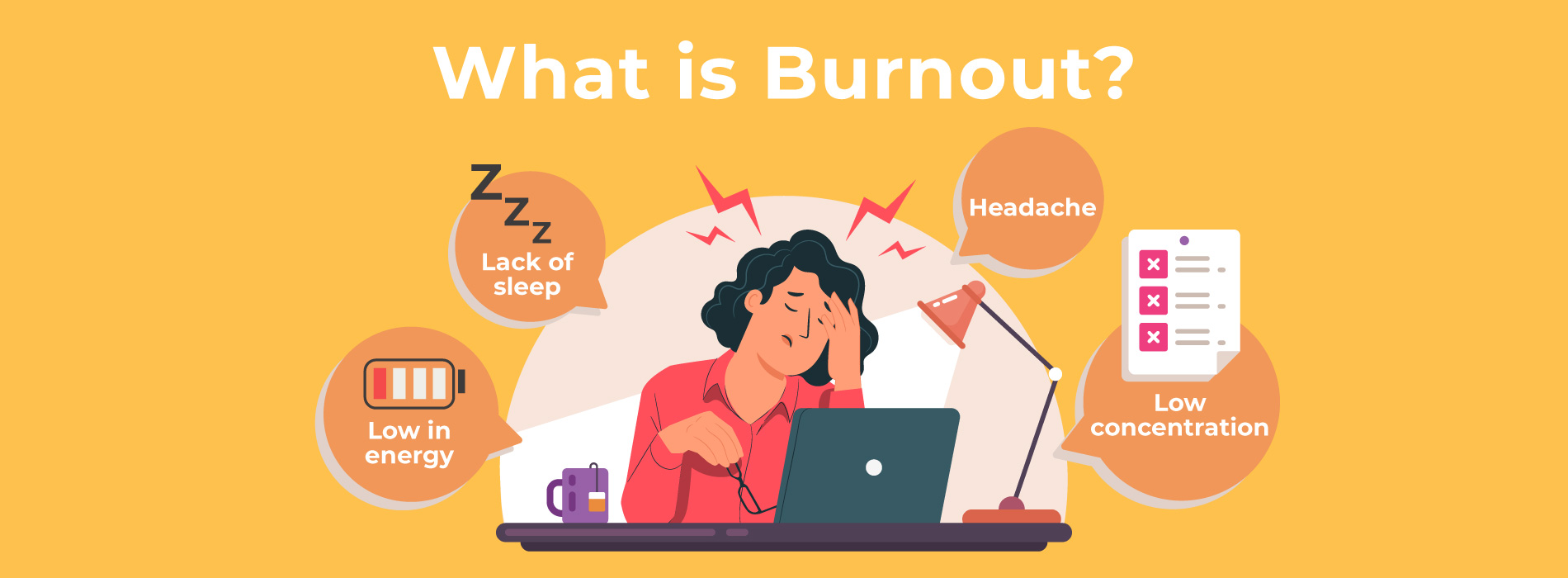Burnout: Symptoms & Ways to Overcome It

Watch out for these signs before it starts to affect you!
Do you find yourself having difficulty coping with day-to-day tasks – from having insomnia to losing appetite, missing deadlines, feeling exhausted and easily frustrated? If these symptoms sound familiar to you, you’re probably experiencing burnout.
Burnout is a gradual process where the state of physical, emotional, and mental exhaustion is caused by excessive and prolonged stress[1]. Much worse than ordinary fatigue, burnout individuals will find it more challenging to cope with stress and handle day-to-day responsibilities.
Burnout, however, isn’t always easy to spot. The signs and symptoms are subtle at first, but they become obvious as time goes on. You may not even realise that you’ve hit burnout until it’s too late where you’ve crossed the line between “I’m just tired” and “too exhausted to function”.
Signs & Symptoms of Burnout
One thing to note for sure is that symptoms of burnout are a rippling effect as a result of prolonged chronic stress.
- Lack of Sleep – Fatigue is a major symptom of burnout. Prolonged chronic stress can affect the neurological and hormonal system that regulates sleep. If the system gets disruptive, you will find it difficult to fall asleep; or even if you do fall asleep, it is rather an interrupted sleep.
- Poor Performance – Physical and mental exhaustion can affect your ability to focus and increase forgetfulness. As a result, you will take a longer time to get the work done and eventually causing more work to pile up.
- Frequent Illnesses – Your body is already physically exhausted leaving your immune system easily compromised to infections, colds and flu.
- Isolation – Burnout individuals tend to feel overwhelmed and easily exhausted about everything. As a result, they begin to withdraw from any social activities nor confide in friends and family.
- Emotional & Easily Irritable – Do you realise that you have become more pessimistic and get easily frustrated even at the smallest things as if you have no control over them? Try to observe if this happens frequently in a
- Loss of Appetite – Burnout can make you lose your appetite, thus resulting in rapid and sudden weight loss.
The Differences Between Stress & Burnout

Although burnout may be the result of unrelenting stress, it is not the same as too much stress. Stressed individuals know that as long as they have everything under control, they will get better. In contrast, people experiencing burnout means mentally exhausted, demotivated and feeling empty.
Ways to Overcome Burnout
Stress may be unavoidable, but burnout is preventable. If you can identify with the symptoms above, what are some of the ways to overcome burnout and feel healthy and positive again:
Dealing with burnout requires the “Three R” approach[2]:
Recognise – Watch out for the warning signs of burnout and accept the fact that you are indeed struggling.
Reverse – Seek ways to reverse the damage by reaching out for support and effective ways to manage stress.
Resilience – Build your resilience to stress by actively taking care of your physical and emotional health.
#1 Reach out to others
One of the first steps to overcoming burnout is opening up your problems with people you trust can be profoundly healing[3]. When you’re in a stressful state, you are more likely to remain in a pessimistic mindset. Thus, surrounding yourself with people you trust will provide you with the support you need to go through the circumstances. In fact, their bits of advice and support can become your main motivation in overcoming it. Alternatively, you may also seek a professional for help as well.
If you happen to witness any friends or family members who are going through a rough time, remember to listen to their difficulties, validate their feelings and concern before jumping into ‘fixing’ mode.
#2 Take a Break & Reevaluate Your Priorities
Have you been 24/7 constantly thinking about work or keeping up with commitments? Perhaps these symptoms that you are facing are a sign of your body overworking. In this case, it’s best to pause and relook at your goals, find balance in life and reevaluate your priorities in what truly is important to you. While it is good to be an overachiever and keep up with priorities, it is also as important in giving yourself some rest time to reflect and heal.
If time and finances allow, start planning for a vacation as it is one of the highly recommended ways to help you recharge and heal physically and mentally without much distraction[4]. Otherwise, take some days off to do what makes you feel fulfilled or just get proper sleep at home.
#3 Support Your Mood and Energy Levels with A Healthy Diet
The types of food and drinks you consume can have a huge impact on your mood and energy level throughout the day. Although foods like rice, pizza, ice cream and other refined carbs may be our comfort foods, these high-carbohydrate foods can quickly cause a crash in mood and energy.
Even though coffee can provide the caffeine to help go through your day, you may also experience some caffeine withdrawal as well. Depending on the individual, some of the symptoms include headaches, tiredness, irritability nausea and more which can last up to two to nine days[5].
Foods containing Omega-3 fatty acids are highly encouraged as they can provide your mood with a healthy boost. Incorporate fatty fishes such as salmon, mackerel, anchovies and sardine as well as seaweed, and walnuts into your meals for that daily intake of Omega-3.
Furthermore, take multivitamins with key ingredients like turmeric, zinc and selenium to improve the weakened immune system. Adaptogens like ashwagandha will also help to increase the body’s stress coping mechanism and promote overall good mood balance[6]. Not to forget, TCM (Traditional Chinese Medicine) containing lingzhi and cordyceps can help boost your energy level to last throughout the day.
Conclusion
Any individual who’s continually exposed to high levels of stress and neglects their own needs can possibly experience burnout. The best solution is to identify what is the stressor and quickly address the root of the problem before leading to serious psychological illnesses as well as heart disease and diabetes.
Always keep this saying in mind, “recharge yourself as much as you charge your phone”.
Disclaimer – All content provided is for educational purposes only, thus the information presented here is not substitute for any professional advice. Kindly consult a professional if needed.
[1] https://www.helpguide.org/articles/stress/burnout-prevention-and-recovery.htm
[2] https://www.helpguide.org/articles/stress/burnout-prevention-and-recovery.htm
[3] https://www.psychologytoday.com/us/blog/your-personal-renaissance/201906/why-talking-about-our-problems-makes-us-feel-better
[4] https://www.forbes.com/sites/nomanazish/2018/01/22/five-reasons-why-travel-is-good-for-your-mental-health/?sh=4513e8a45934
[5] https://my.clevelandclinic.org/health/articles/15496-caffeine-how-to-hack-it-and-how-to-quit-it
[6] https://www.healthline.com/health/adaptogenic-herbs#effectiveness










